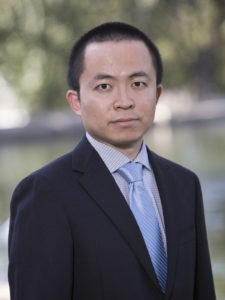Dr. Yu (Frank) Yang received his Ph.D. from Peking University (China) in 2010. After that, he spent three years for postdoctoral projects at Yale University and University of Notre Dame. He started his independent career in Fall 2013, as an assistant professor in the Department of Civil and Environmental Engineering at University of Nevada, Reno. His research is focused on the fate of carbon and emerging contaminants in redox cycles, including carbon stability in soil environment, microbial degradation and plant uptake of carbon nanotube, and biochar-facilitated microbial degradation of emerging organohalogen. His group also applied fundamental environmental chemistry to the area of water reuse.
Read his Emerging Investigator article “Quantification of Multiwall Carbon Nanotubes in Plant Tissues with Spectroscopic Analysis” and read more about him in the interview below:
Your recent Emerging Investigator Series paper focuses on quantification of multiwall carbon nanotubes in plant tissues with spectroscopic analysis. How has your research evolved from your first article to this most recent article?
Quantification of carbonaceous nanomaterials in complex environmental media is important for managing their application and understanding the environmental implication, but challenging. In our first article in this area, we have applied Raman spectroscopic analysis for detecting carbon nanotube in plant tissues with limited quantitative information. Then, through coupling digestion with programed thermal analysis, we have developed quantification for carbon nanotube in our recent EST Letter paper. In this Emerging Investigator Series paper, UV-vis spectroscopic analysis was used to quantify carbon nanotubes in various plant tissues (leaf, stem, and root), which can potentially enable widely-applied and rapid quantification for this important engineered nano particles.
What aspect of your work are you most excited about at the moment?
Currently, we are exploring application of carbonaceous nanomaterials in agriculture, such as enhancement of photosynthesis, sensor for nutrition/water status and others. Hopefully, we can develop some exciting applications of carbonaceous nanomaterials in agriculture, food and water areas.
In your opinion, what are the most important questions to be asked/answered in this field of research?
To my mind, it is important to quantitatively evaluate the distribution and fate of engineered nanoparticles in soil-plant systems and develop cost-effective application for urgent needs in the area.
What do you find most challenging about your research?
Carbon nanotubes are primarily composed of carbon, as similar as biological (plant) materials. To minimize the influences of environmental matrix but still maintain the recovery and reasonable detection limit is the most challenging part in our research.
In which upcoming conferences or events may our readers meet you?
I will present related work in the upcoming 2018-2019 SSSA International Soils Meeting, “Soils Across Latitudes,” on Jan. 6-9, 2019, in San Diego, California. My colleagues and I will also chair a symposium of “Nanotechnology at the Water-Agriculture-Energy Nexus” in Spring 2019 ACS National Meeting on Mar 31–Apr 4 in Orlando.
How do you spend your spare time?
When I am free, I enjoy watching movies, playing chess, reading books, and spending time with family.
Which profession would you choose if you were not a scientist?
I think a possible alternative career for me is a high-school teacher.
Can you share one piece of career-related advice or wisdom with other early career scientists?
At this point, I would say “persistence” is most important.











